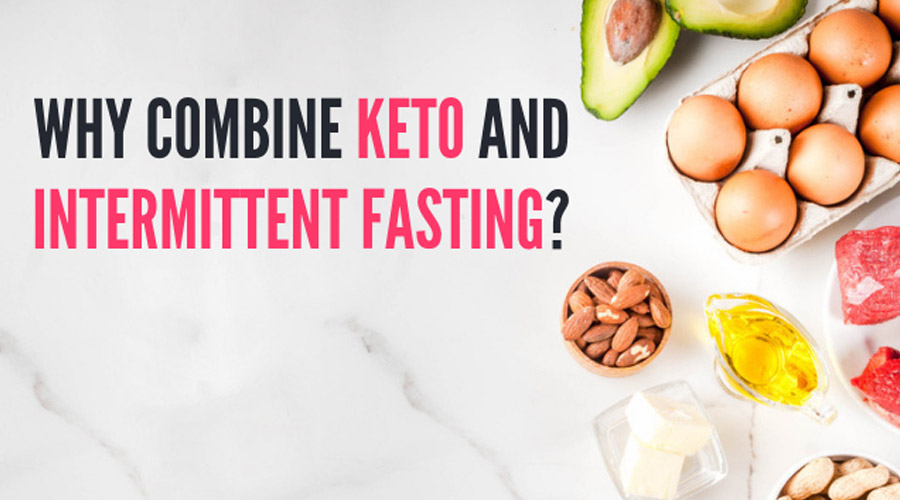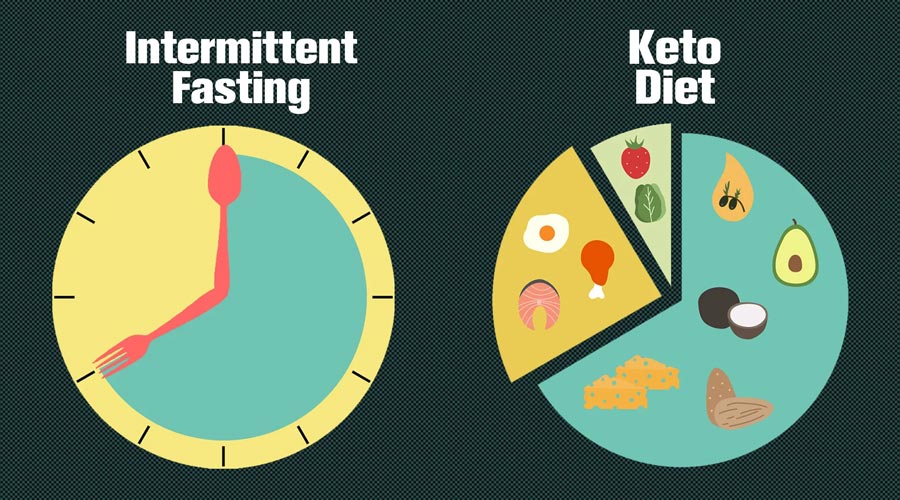Looking to lose weight and feel great? Keto fasting might be the answer for you! This revolutionary way of eating has been shown to help people lose weight quickly and easily. In this blog post, we will discuss what keto fasting is, how it works, and some of the benefits that you can expect to see. We will also provide a few tips on how to get started with keto fasting. So if you’re ready to start seeing results, keep reading!
Table of Contents
Why combining intermittent fasting with keto has become popular for weight loss
When it comes to weight loss, keto and intermittent fasting are two of the most popular diets out there. And for good reason! Both of these methods have been shown to be effective in helping people lose weight and regulating food intake. But what happens when you combine them?

The keto diet is a low-carb, high-fat diet that has been shown to help people lose weight quickly and easily. In fact, many people who follow the keto diet report losing up to 20 pounds in just a few weeks! Intermittent fasting is another popular weight loss method that involves going without food for set periods of time. When combined, these two methods can help you see even greater results!
Ways to combine Keto and Intermittent Fasting.
There are a few different ways that you can combine keto and intermittent fasting. One popular way is to do a keto fast, which is a combination of keto and intermittent fasting. During a keto fast, you will follow the keto diet during the day (eating window) and then fast for 16-24 hours at night. This can be a great way to see quick results!
Another way to combine keto and intermittent fasting is to do a cyclical ketogenic diet. This involves an alternate day fasting; following the keto diet for five days per week and then eating normally for two days. This method allows you to enjoy more variety in your food choices while still seeing results from the keto diet!

How does keto fasting work?
The ketogenic diet works by forcing your body into a state of ketosis. Ketosis is a natural metabolic state in which your body is burning fat mass for fuel instead of carbohydrates. When your body is in ketosis, you will experience increased energy levels and accelerated weight loss success.
Intermittent fasting works by allowing your body to burn through its stored glucose (carbohydrates) before turning to stored fat for energy. By doing this, you will help your body burn more fat and lose weight quickly!
Know the Difference of Testosterone Enanthate vs Cypionate
Who should try an Intermittent fasting keto approach?
Anyone who is looking to lose weight and improve their health should try keto fasting. This approach is especially beneficial for people who are struggling with obesity, diabetes, or heart disease. But even if you don’t have any of these conditions, keto fasting can still help you lose weight and feel great!
Tips for getting started with keto fasting

If you’re ready to start keto fasting, here are a few tips to help you get started:
- Make sure to eat plenty of healthy fats. Healthy fats are essential on the keto diet and they will also help keep you feeling full during your fast. Some good sources of healthy fat include olive oil, coconut oil, avocado, and nuts and seeds.
- Drink plenty of water. Staying hydrated is key when you’re fasting, so make sure to drink plenty of water throughout the day. You can also drink bone broth or herbal tea to help keep your hunger at bay.
- Get plenty of sleep. Getting enough rest is important for both your physical and mental health. Make sure to get at least seven hours of sleep each night to stay keto fasting!
What is intermittent fasting?
Intermittent fasting is a weight-loss method that involves going without food for set periods of time. There are a few different ways to do intermittent fasting, but the most common approach is to fast for 16-24 hours at a time. Intermittent fasting also preserves and maintain muscle mass during weight loss and improves energy levels.

Can I drink coffee while intermittent fasting?
Yes! You can drink coffee while intermittent fasting. Coffee can help increase your metabolism and help you burn more fat. Just be sure to avoid adding sugar or cream to your coffee, as this will break your fast.
See More About Testosterone Tabs Use
What is the keto diet?
The keto diet is a low-carb, high-fat diet that has been shown to help people lose weight quickly and easily. In fact, many people who follow the keto diet report losing up to 20 pounds in just a few weeks!

How do I know if I’m in ketosis?
There are a few different ways to test for ketosis. The most common way is to use a urine strip test, which will change color if ketones are present in your urine. You can also use a blood ketone meter to test for ketones in your blood. Finally, you may experience some of the signs and symptoms of ketosis, such as increased energy levels, accelerated weight loss, and decreased hunger.
Potential benefits of practicing both

Here are some of the benefits you could gain if you practice both of these amazing weight-loss diets!
- Increased energy levels
- Accelerated weight loss
- Decreased hunger
- Better mental clarity
- Improved cardiovascular health
- Reduced risk of diabetes and heart disease.
Backed benefits of a keto diet
A keto diet has many potential benefits including:
- weight loss
- improved mental clarity
- reduced inflammation
- stabilized and improved blood sugar control
Here are some more of these benefits!
Enhanced weight loss
There are many potential benefits to keto dieting, including weight loss, improved mental clarity, and reduced inflammation. The keto diet is a low-carb, high-fat diet that has been shown to be an effective way to lose weight quickly and easily. In fact, many people who follow the keto diet report losing up to 20 pounds in just a few weeks!
Epilepsy and neurological disorders

The Keto diet has been found to protect people from epilepsy and other neurological disorders. This is because ketosis causes an increase in ketone bodies, which helps to protect the brain from damage. The keto diet has also been shown to help reduce inflammation, which can help to protect the brain from disease.
Improved blood markers
The keto diet has been found to improve our blood markers, including blood sugar levels, insulin resistance, and cholesterol levels. In fact, many people who follow the keto diet see a dramatic improvement in their blood markers in just a few weeks.

This is because the keto diet helps to improve insulin resistance and reduce inflammation, both of which can have a negative impact on our blood markers.
Benefits of intermittent fasting
Intermittent fasting has been shown to have a number of benefits, including weight loss, improved mental clarity, and reduced inflammation. It can also help to stabilize blood sugar levels and protect against diseases such as epilepsy and heart disease.
Know More About Sustanon 250 for Sale
Longevity
Intermittent fasting has been shown to have a number of health benefits, including weight loss, improved mental clarity, and reduced inflammation. Some studies have even shown that intermittent fasting can help to promote longevity.

One study published in the journal Cell Metabolism found that intermittent fasting can help protect against age-related damage to the brain. The study found that intermittent fasting helped to reduce inflammation and improve the function of cells in the brain.
Another study published in the journal JAMA Internal Medicine found that intermittent fasting can help protect against cancer. The study found that people who practiced intermittent fasting had a lower risk of cancer than those who didn’t.
Finally, a study published in the journal Nutrients found that intermittent fasting can help to protect against heart disease. The study found that intermittent fasting helped to improve heart health by reducing inflammation and improving cholesterol levels.
Insulin resistance
Insulin resistance is a condition in which the body doesn’t use insulin properly. This can lead to a variety of health problems, including diabetes, heart disease, and obesity.

Intermittent fasting has been shown to be an effective way to treat insulin sensitivity. In fact, many people who practice intermittent fasting see a dramatic improvement in their insulin resistance in just a few weeks. This is because intermittent fasting helps to improve insulin resistance and reduce inflammation, both of which can have a negative impact on our insulin resistance.
Reduced inflammation
Intermittent fasting has been shown to be an effective way to reduce inflammation. In fact, many people who practice intermittent fasting see a dramatic reduction in inflammation in just a few weeks.

This is because intermittent fasting helps to reduce inflammation and improve insulin resistance, both of which can have a negative impact on inflammation.
Weight loss
Intermittent fasting has been shown to be an effective way to lose weight quickly and easily. In fact, many people who follow intermittent fasting report losing up to 20 pounds in just a few weeks!

This is because intermittent fasting helps to improve insulin resistance and reduce inflammation, both of which can have a positive impact on rapid weight loss.
Heart-healthy
Intermittent fasting has been shown to be an effective way to keep our hearts healthy. In fact, many people who practice intermittent fasting see a dramatic improvement in their heart health in just a few weeks!
This is because intermittent fasting helps to reduce inflammation and improve insulin resistance, both of which can have a negative impact on our heart health.

Reduced risk of disease
Intermittent fasting has been shown to be an effective way to reduce the risk of diseases such as cancer, heart disease, and Alzheimer’s disease. This is because intermittent fasting helps to improve insulin resistance and reduce inflammation, both of which can have a negative impact on our health.
Cognitive function
Intermittent fasting helps to improve our cognitive function by reducing inflammation and improving insulin resistance, both of which can have a negative impact on our cognitive function. In fact, many people who practice intermittent fasting report feeling more clearheaded and focused after just a few weeks!
This is because intermittent fasting helps to reduce inflammation and improve insulin resistance, both of which can have a positive impact on our cognitive function.
A sample menu for keto and intermittent fasting

When practicing keto fasting, it’s important to include plenty of healthy, keto-friendly foods in your diet. Some keto-friendly foods to include in your diet are meat, eggs, fish, cheese, vegetables, and nuts. It’s also important to avoid eating high-carbohydrate foods, such as bread, pasta, rice, and sweets. Also, watch your calorie intake.
Day 1
Breakfast: keto coffee or tea with butter and MCT oil
Lunch: salad with chicken, cheese, and avocado
Dinner: salmon with broccoli and keto-friendly dressing
Day 2
Breakfast: keto smoothie made with almond milk, protein powder, and avocado
Lunch: tuna salad with mayonnaise and keto-friendly vegetables
Dinner: chicken breast with spinach and keto-friendly sauce
Day 3
Breakfast: eggs cooked in butter with bacon and keto-friendly vegetables
Lunch: hamburger (no bun) with lettuce, tomato, onion, pickles, and mayonnaise
Dinner: pork chops with Brussels sprouts and keto-friendly gravy
As you can see, there are plenty of keto-friendly foods that you can eat while intermittent fasting. By including these keto-friendly foods in your diet, you’ll be able to stick to your ketogenic diet and reap the benefits of intermittent fasting!
Should you combine them?

There is no right or wrong answer when it comes to the keto diet and intermittent fasting – it all depends on what works best for you. Some people find that they can stick to their keto diet more easily by combining it with intermittent fasting, while others find that intermittent fasting makes it more difficult to stick to their keto diet. The bottom line is that you should experiment until you find what works best for you. However, pregnant or breastfeeding women, with health conditions, and those with a history of disordered eating should avoid intermittent fasting.
Summary
Intermittent fasting has been shown to be an effective way to lose weight quickly and easily, as well as improve heart health, reduce the risk of disease, and improve cognitive function. Keto diet and intermittent fasting can be combined or practiced separately, depending on what works best for you.
So, if you’re looking for a keto diet and intermittent fasting as a means of weight loss or improving your health, be sure to experiment until you find what works best for you. There are no right or wrong answers when it comes to keto and intermittent fasting – so just experiment and choose a plan to stick to!
FAQ’s
How long should you fast on keto?
There is no one-size-fits-all answer to this question – it all depends on your goals and what works best for you. Some people find that they can fast for 16 hours per day and still stick to their keto diet, while others find that they need to fast for 24 hours per day. Ultimately, it’s up to you to experiment and find what works best for you.
What is allowed on keto fasting?
There are a few different things that you’ll need to consider when keto fasting, such as what types of food you can eat and how many hours you should fast for. When it comes to food, you’ll want to make sure that you’re including plenty of keto-friendly foods in your diet, such as meat, eggs, fish, cheese, and vegetables. You’ll also want to avoid eating high-carbohydrate foods, such as bread, pasta, rice, and sweets. As for how many hours you should fast for, there is no one-size-fits-all answer – it all depends on your goals and what works best for you. Ultimately, it’s important to experiment until finding a plan that works for you.
Will a 16 hour fast put me in ketosis?
There is no one-size-fits-all answer to this question – it all depends on your goals and what works best for you. Some people find that they can fast for 16 hours per day and still maintain ketosis, while others find that they need to fast for 24 hours per day to achieve ketosis. Ultimately, it’s up to you to experiment and find what works best for you.
When should I start keto fasting?
The best time to start keto fasting is by gradually adding more hours of fasting each day until you reach your desired goal. For example, if you want to fast for 16 hours per day, you can start by fasting for 12 hours per day and gradually increase the number of hours until you reach your desired goal. It’s also important to make sure that you’re eating plenty of keto-friendly foods while fasting so that you don’t lose any muscle or energy.
What is considered fasting on keto?
Fasting on keto typically consists of not eating for a certain period of time, such as 16-24 hours. During this time, you’ll want to make sure that you’re drinking plenty of water and ketone supplements to help maintain your energy levels. You may also want to consider including some type of exercise in your fasting routine to help keep your body active.





